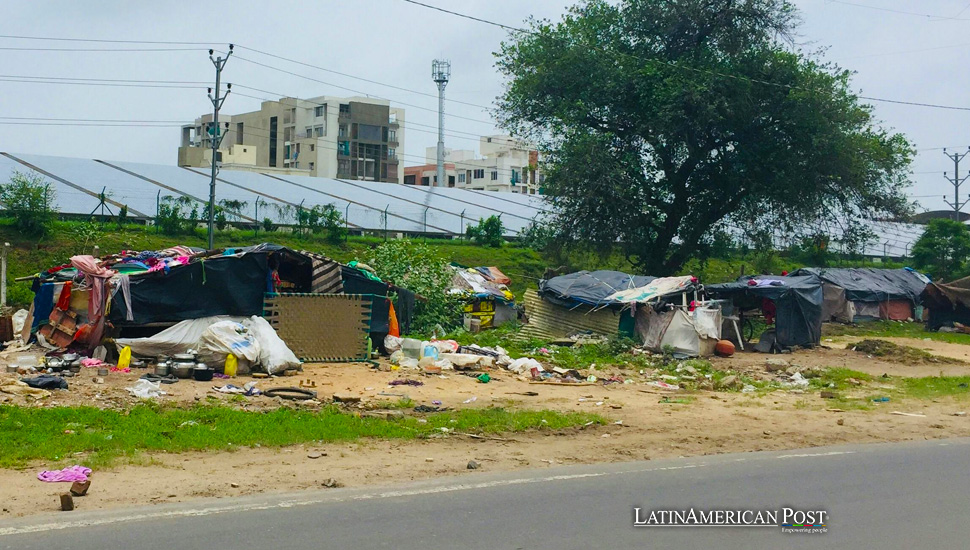Argentina’s Poverty Surge to 57.4%: A Reflection of Latin America’s Economic Struggles

Argentina’s poverty level soared to 57.4% in January, the highest in two decades, underscoring the severe economic challenges faced by the nation and reflecting broader issues across Latin America.
Economic Crisis Unveiled
In January, Argentina witnessed its poverty levels reach an alarming 57.4%, the highest recorded in at least twenty years. This dire statistic, reported by the Catholic University of Argentina (UCA) and widely cited by local media, paints a grim picture of the nation’s economic health and highlights the broader challenges faced across Latin America. The sharp increase in poverty has been attributed to a series of financial measures, including the significant devaluation of the peso by President Javier Milei, which exacerbated inflation and led to a drastic increase in the cost of living for the average Argentine.
President Milei, who assumed office with promises of radical economic reforms to stabilize the Argentine economy, initiated a bold 54% devaluation of the peso against the U.S. dollar. This move, part of a broader strategy to “dollarize” the economy and tackle the country’s spiraling inflation rate of over 200%, immediately and profoundly affected the population’s purchasing power. Alongside the devaluation, the government also reduced energy and transportation subsidies. It introduced tax hikes, measures intended to achieve fiscal balance but have contributed to the hardship many Argentines face.
The situation in Argentina is not isolated but reflects a broader trend of economic volatility and social challenges across Latin America. The region has long grappled with issues of income inequality, inflation, and fiscal deficits, contributing to high poverty levels and social unrest. Countries like Venezuela, with its prolonged economic crisis, and Brazil, with its battles against inflation and poverty, mirror the complexities of achieving sustainable economic growth and social equity in the region.
Historical Context of Economic Cycles
Historically, Latin America has been marked by cycles of economic booms and busts, often tied to fluctuations in commodity prices and external financial conditions. Structural issues characterize the region’s economies, including dependency on primary exports, weak institutions, and fiscal mismanagement. These challenges have been compounded by political instability and corruption, undermining efforts to implement effective economic policies and social programs.
Argentina’s economic history provides a context for understanding the current crisis. The country has experienced repeated economic downturns over the past century, including hyperinflation in the late 1980s and a major financial crisis in 2001 that led to a significant debt default. These crises have eroded trust in the country’s financial institutions and currency, leading to recurrent cycles of inflation and devaluation.
The recent measures taken by the Milei administration, while aimed at addressing some of these deep-rooted issues, have sparked debate and controversy. For example, the decision to devalue the peso and cut subsidies was intended to improve fiscal health and reduce inflationary pressures. However, these actions have also increased the cost of living for many Argentines, pushing more individuals and families into poverty.
This surge in poverty levels in Argentina is a stark reminder of the fragility of economic stability in Latin America and the profound impact of policy decisions on the lives of ordinary citizens. It underscores the importance of adopting comprehensive and inclusive economic strategies prioritizing social welfare and fiscal and monetary stability.
Comparatively, other countries in the region have also faced similar challenges. In Venezuela, hyperinflation and economic mismanagement have led to one of the most severe financial crises in modern history, with poverty and malnutrition widespread. Despite significant progress in reducing poverty in Brazil in the early 21st century, economic recessions and political turmoil have reversed some of these gains.
Coordinated Approach to Reform
The situation in Argentina and its parallels across Latin America highlight the need for a coordinated approach to economic reform and social policy. Governments in the region must balance the imperative of economic stabilization with the need to protect the most vulnerable populations from the adverse effects of such policies. This includes investing in social programs, improving access to education and healthcare, and creating more equitable economic opportunities.
Furthermore, the Argentine experience emphasizes the importance of addressing structural economic issues, such as diversifying exports, strengthening institutions, and fostering innovation and productivity. By tackling these underlying challenges, countries in Latin America can build more resilient economies capable of withstanding external shocks and reducing the risk of poverty and inequality.
Also read: Poverty And Inflation In Argentina: These Are The Figures
Argentina’s alarming poverty rate is a call to action for the nation and Latin America. It serves as a reminder of the complex interplay between economic policy, social welfare, and long-term development. As Argentina navigates its current financial challenges, its experience offers valuable lessons for the region in pursuing sustainable growth and social justice. This crisis, while daunting, also presents an opportunity for Argentina and its neighbors to rethink their economic models and embrace reforms that can lead to a more prosperous and equitable future for all citizens.





